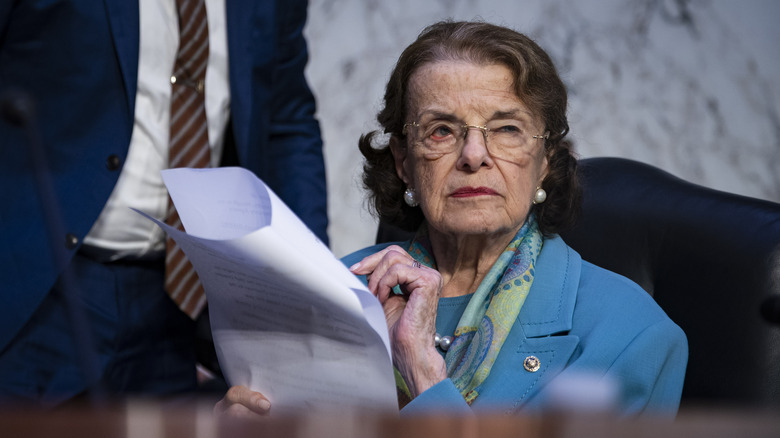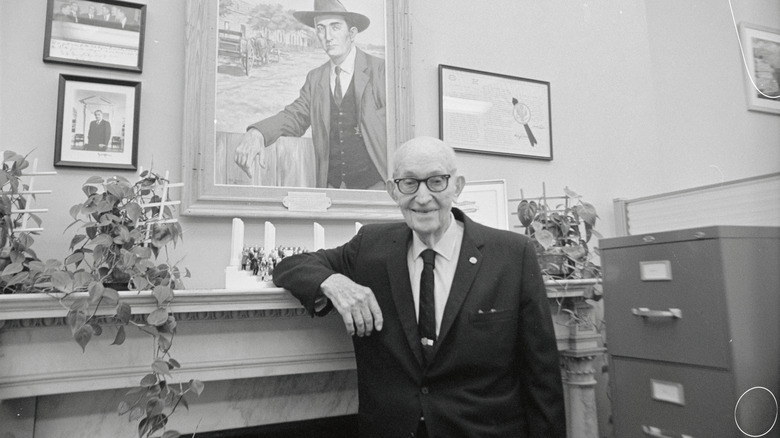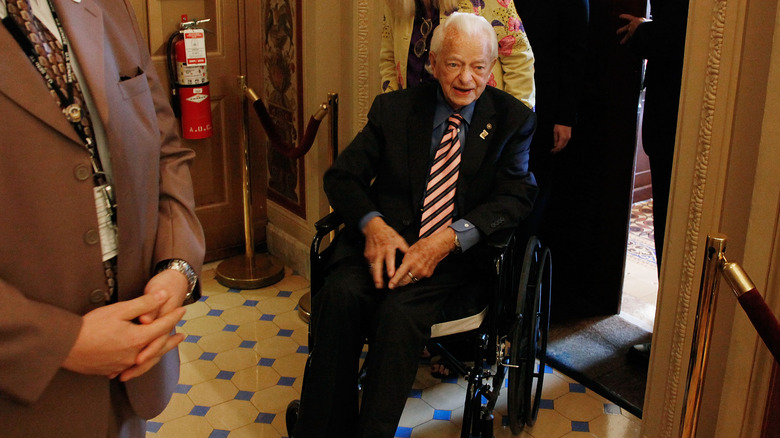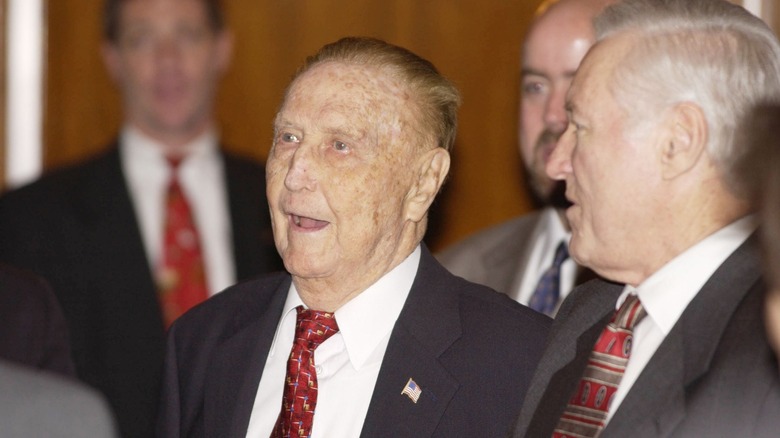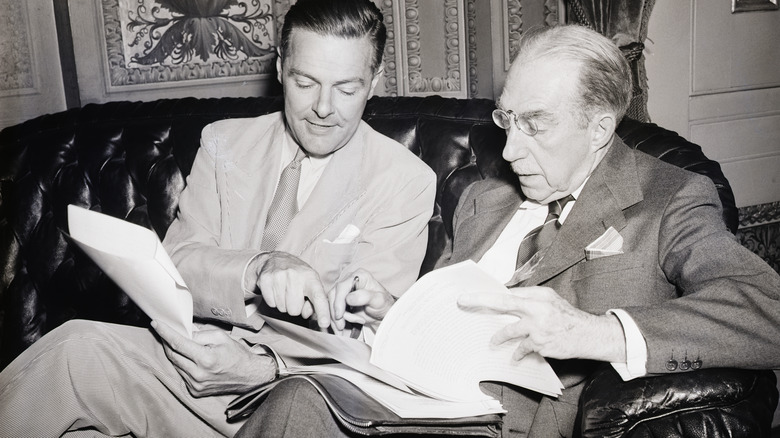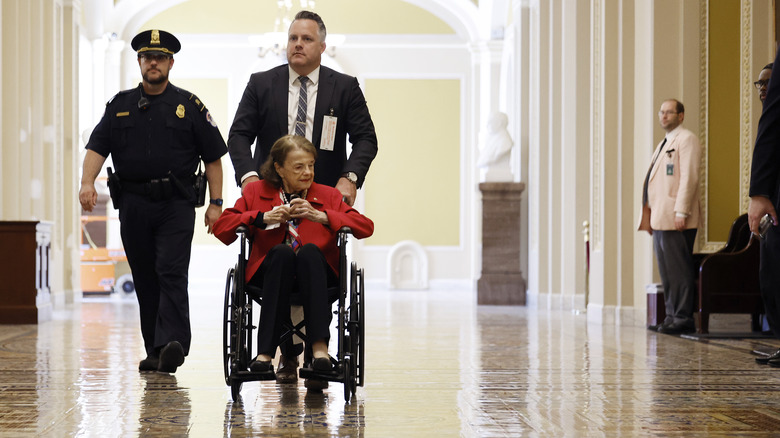United States Senators Who Served In Their 90s
While the Founding Fathers put a lot of time and effort into the Constitution, one thing they didn't include was term limits for members of the three branches of government. Considering they had recently rebelled against a king, this could seem like a significant oversight.
Perhaps the main reason the Founders didn't think to add an upper age limit for elected officials is that back in the day, living to the age of, say, 90, was very rare. Of the 56 signers of the Declaration of Independence, for example, only two made it nonagenarian status, with a third dying less than three months shy of the milestone. Only in their wildest dreams could the Founders have predicted the advances in medicine and technology that would allow men and women to regularly serve in the Federal government at such an advanced age. Of the six U.S. senators who have served into their 90s, none did so before the middle of the 20th century, but considering that, as of 2023, the median age of a senator is 65, with over a dozen aged 75 or older, the number is likely to increase relatively quickly.
So, who were these senators who served decades past retirement age? And what drove them to keep working in government, rather than go back home and spend their final years with their grandchildren? Here are all the senators (so far) who governed into their 90s.
Chuck Grassley
After the death of his colleague Dianne Feinstein in September 2023, Senator Chuck Grassley is the only current member of Congress in the 90s. Born on September 17, 1933, Grassley first entered public service at the state level as a member of the Iowa legislature in 1958. While he continued to run a farm over the decades, he has been an elected official ever since, making it to the U.S. House of Representatives in 1974. Only six years later, he was elected to the U.S. Senate, where he has firmly stayed put.
The Republican was interviewed by the Globe Gazette in 2020 and played down concerns about his age, saying, "What's more of a factor is my ability to do the job," adding, "I'm working just as hard now as I did when I was 40 years younger, 40 years ago."
However, Grassley knew that for many of his constituents, age could be a very big factor. This came through in the manner he chose to announce that he would again run for reelection, seeking another 6-year term that, if he lived, would see him serving until he was at least 95. In a tweet, complete with a video of him exercising, he wrote, "It's 4 a.m. in Iowa so I'm running. I do that 6 days a week. Before I start the day I want you to know what Barbara and I have decided. I'm running for re-election — a lot more to do, for Iowa."
Carl Hayden
In 1877, Rutherford B. Hayes was sworn in as president, Queen Victoria was declared empress of India, and Carl Hayden was born in Arizona Territory — because Arizona wasn't even a state yet. Arizona eventually got around to becoming a state in 1912, and five days later, Hayden became its only member of the House of Representatives. Fifteen years after that, Hayden moved over to the Senate. During his many decades in Congress, the Democrat became known as a particularly hard-working member of government.
As recorded in "The Bureau of Reclamation: History Essays from the Centennial Symposium," Hayden announced his retirement on his own terms, and with the understanding it was time to go: "Among other things that 56 years in Congress have taught me is that contemporary events need contemporary men. Time actually makes specialists of us all. When a house is built there is a moment for the foundation, another for the walls, the roof, and so on. Arizona's foundation includes fast highways, adequate electric power, and abundant water, and these foundations have been laid. It is time for a new building crew to report, so I have decided to retire from office at the close of my term this year."
He was 91 years old and had been serving in Congress just shy of 57 years when he retired in 1969. Hayden could have padded it out a bit had he wanted, since he lived another three years, dying in 1972.
Robert Byrd
The record for longest-serving senator, one that had been set by Carl Hayden when he retired in 1969, was finally bested in 2006, by Senator Robert Byrd of West Virginia — three years later, he toppled Hayden's record of overall length of time in Congress in any role. First elected to the House in 1952, and the Senate six years later, Byrd's longevity in government was especially notable because, unlike many of his privileged colleagues, he came from a very poor background.
By 2008, Byrd required a wheelchair and was visibly unwell, to the point that, as GQ explained, there was a "Byrd Death Watch" in Washington, D.C., as well as some machinations by his Democrat colleagues to take away some of his powerful committee assignments. According to the outlet, when asked by a reporter if the then-71-year-old candidate John McCain was too old to be president of the United States, Byrd was emphatic: "No, he's not too old to be president! No! Of course, he's not! And I'm not either! You're looking at a man who could be president — right now!" The reporter went on, "Do you feel a kind of wisdom at age 90 that you didn't have when you were 60?" The senator replied, "Well, of course! I'd have to! I'd have to think I'd learn something through all these long years!"
Byrd was still in office when he died on June 28, 2010, at age 92.
Strom Thurmond
Strom Thurmond might not have the record for longest-serving senator, but he was the oldest person ever to hold that position. Not only did he serve in the Senate in his 90s, but he made it, just barely, to 100: His birthday was December 5, 1902, and his final term ended January 3, 2003. Elected for the first time to one of South Carolina's Senate seats in 1954 as a Democrat, Thurmond became a Republican in 1964.
Thurmond, an incredibly controversial figure who was fanatically against integrating society in the middle of the 20th century, had been a senator for so long that people worried leaving the job might kill him. This was despite the fact that, by the end of his time in Washington, D.C., he was living full-time in a hospital. "The Senate and public life is such an incredible part of his being," said then-Senator Joe Biden told The Gainesville Sun. "I think it has helped keep him alive and well and active. I am mildly concerned about what effect it is going to have on him, not to have that purpose." Retiring before his final term ended was not an option for Thurmond. A family friend told the paper, "He is very insistent on wanting to be there in the Senate until his last day."
After 48 years as a senator, Thurmond's retirement lasted just under six months. He died on June 26, 2003.
Theodore F. Green
Theodore Green was born just two years after the Civil War ended, on October 2, 1867. He was a whopping 93 years old when he retired from the Senate in 1961, but perhaps even more striking is that he didn't start until he was already past retirement age. He was 65 when he ran for governor of Rhode Island, a position he held twice, and became a senator for that state in 1937, when he was 69.
When he announced he was retiring, a colleague made a speech in the Senate chamber (via GovInfo), which made clear age had been affecting his ability to work: "Theodore Francis Green rose to the heights of dedicated service and personal sacrifice when, last year, he surrendered the prestige and power of the chairmanship of the Senate Committee on Foreign Relations. He did this in order that his temporary physical handicaps might not impede full progress in a year critical in our international responsibilities."
It must have been hard for Green to do that, since he famously said, "Most people say that as you get old you have to give up things. I think you get old because you give up things." (This eminently quotable line has been borrowed by many others, including Lyndon B. Johnson, per The American Presidency Project.) Whether it was giving up his job as a senator or just plain old age, the last five years of Green's life were filled with bad health. He died on May 19, 1966, aged 98.
Dianne Feinstein
In the 2020s, with an increasingly aged Senate getting older every day, the topic of term limits and hot takes on how old is too old to serve started being discussed with more urgency. The senator often pointed to as an example was Dianne Feinstein of California, who was born on June 22, 1933. Not only was she the oldest member of the Senate at the time but, increasingly, it seemed like she was suffering from the mental and physical limitations that affect everyone as they get older — concerning for someone involved in governing the nation.
In February 2023, Feinstein released the official announcement that she would not run for reelection the following year; however, it also made clear she was not planning to step down before her term ended. This was, of course, big news, and not long after, a reporter asked her a question about it. As reported by The Hill, the Democrat responded, "Well, I haven't made that decision. I haven't released anything." A member of her staff jumped in to remind her, "Senator, we put out your statement." This seemed to be news to Feinstein, who replied, "You put out the statement? I should have known they put it out."
However, she stayed in the Senate, which she had first been elected to in 1992, until she died on September 29, 2023. Only the morning before, she had been on Capitol Hill, where she voted for what would be the final time.
